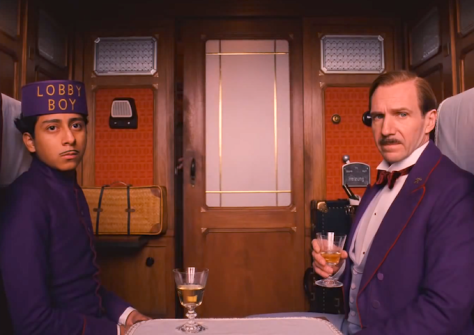
Among the more central themes in Wes Anderson’s remarkable 2014 film ‘The Grand Budapest Hotel’ is that of a lost European ideal. A kind of requiem for a mittle-european golden age, it explores this grand theme through a simple but effective dramatic device.
The film begins in the ‘present’ day: opening on a grim urban cityscape, with graffiti and loitering punks, a schoolgirl enters the Zubrowka Cemetary to where the statue to The Author stands in the centre. The statue is neglected, isolated, and anachronistic, representing ideals from another time. The schoolgirl takes out her book, and reads it from a nearby bench, and this reading becomes the narrated voice of The Author throughout the film.
The effective prologue to the story is The Author speaking from his study in 1985, explaining the events that begin the main narrative. Then, he explains a tale beginning in 1968, during his stay in the then-deserted, faded Grand Budapest. From there, he narrates the tale from Mr Moustafa (‘Zero’) which in itself begins in 1932. So even to get to the beginning of the core story, the viewer has leapt from the present day, to 1985, to 1968, and then finally to the pre-war period.
The events of the story are effectively bookended between repeats of a single incident: the stopping of the train outside a countryside barley field, first by the gendarmerie and second by the occupying military. On both occasions their target is the refugee Zero, and on both occasions Gustave comes to his defence. Both scenes display a real humanity and anger that is unrepresentative of the rest of the film, and imbues it with real soul. But it is also an indication as to how far the fictional Zubrowka (a stand-in for Czechoslovakia, just as Lutz is for Prague, where it was shot) and with it the whole of Europe has changed in the interim: whereas on the first occasion, personal loyalty and manners had influence, by the second such things had become an irrelevance. Gustave’s newly acquired power and wealth, nor his flamboyant personal affectations, could save him from a summary execution.
Between these two nearly identical incidents, the events of the story play out on two levels: that of the personal adventures of Gustave, Zero & Agatha, which eventually lead to the personal victory of owning the Grand Budapest and rescuing it (and themselves) from adversity; and that of the socio-political machine grinding away in the background. Zero is a refugee of the war, which has yet to arrive to Zubrowka at the start of the narrative, but the gradual encroachment of the army into civilian life is apparent throughout the story. The occupation of the hotel itself by the fascist armed forces is an illustration of how European ideals of civility had been usurped by forces beyond the characters’ control, and although Gustave was able to outrun history to an extent it still caught up with him in the end, and to deadly effect. As he puts it himself: “You see, there are still faint glimmers of civilization left in this barbaric slaughterhouse that was once known as humanity. Indeed that’s what we provide in our own modest, humble, insignificant… oh, fuck it.”
The jarring impact of Gustave’s execution on the narrative is profound; after a brief period of joyous normality we find ourselves, in a way, retreating away from that golden era towards the mundane present. Back to 1968, where Mr Moustafa explains that he had to sacrifice everything else he inherited from Gustave to keep the Grand Budapest, which was now just the decaying edifice of what it once was, from the ‘new’ (Communist) authorities; then to 1985, where The Author explains how he went travelling immediately after the events of 1968; and then to the present day, when the schoolgirl completes her reading. The tides of the story ebb and flow like the fortunes of Europe itself, and the contrast between the lost world of the Grand Budapest (“rich, old, insecure, vain, superficial, blonde and needy”), and the grim reality of modern life, is devastating.
The demolition of the Grand Budapest, referred to in those final scenes, has an evident symbolic weight: for Zero, it was a representation of his love for Agatha and their time together, whereas for the viewer, and for The Author too, it represents that era of a civilised Europe before it’s ideals were destroyed by war, totalitarianism, and commerce. “It was an enchanting old ruin…but I never managed to see it again.” – The Author’s final words effectively lamenting both the Grand Budapest, and a version of Europe.
